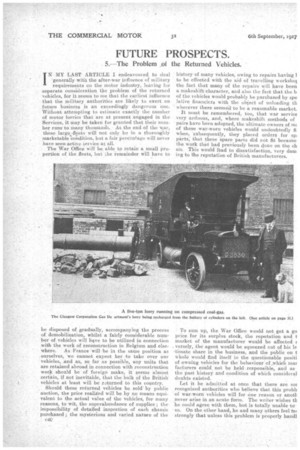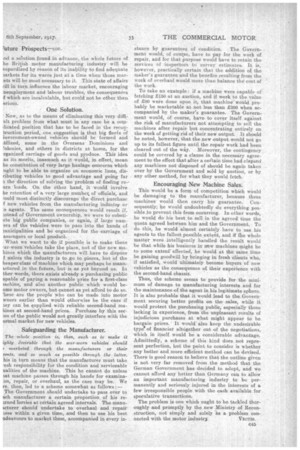FUTURE PROSPECTS.
Page 10

Page 11

If you've noticed an error in this article please click here to report it so we can fix it.
5.—The Problem of the Returned Vehicles.
I11%T .14-Y. LAST• ARTICLE I endeavoured to deal -generally with the after-war influence of military requirements on the motor industry, leaving for separate consideration the problem of the returned vehicles, for it seems to me that the earliest influenee that the military authorities are likely to exert on future business is an exceedingly dangerous one. Without attempting to estimate exactly the number of motor lorries that are at present engaged in the Services, it maybe taken for granted that their mmiber runsto Many thousandS.. At. the end of the war, these largek:fleets will not only be in a thoroughly marketable condition, but a fair pereSnl ago will never have seen active service at all.
The War Office will be:able to retain a small Proportion of the fleets, but the remainder will have to
be disposed of gradually, accompanying the process of demobilization, whilst a fairly considerable number of vehicles will have to be utilized in connection with the work of reconstruction in Belgium and elsewhere. As France will be in the same position as ourselves, we cannot expect her -to take over our vehicles, and as, so far as possible, any units that are retained abroad in connection with reconstruction woqg should be• of foreign make, it seems almost certain, if not inevitable, that the bulk of the British vehicles at least will be raturned to this country.
• Should these returned vehicles be sold by public auction, the price realized will be by no means equivalent to the actual value of the vehicles, for many reasons, to wit, the superabundance of supplies ; the impossibility of detailed inspection of each chassis purchased ; the mysterious and varied nature of the e40 history of many vehicles, owing to repairs having 1 to be effected with the aid of travelling workshor the fact that many of the repairs will have been a makeshift character, and also the fact that the b of the vehicles would probably be purchased by ape lative financiers with the obiect of unloading th wherever there seemed to be a reasonable market.
It must be remembered, .too, that war service very arduous, and, where makeshift methods of pairs have been adopted, the ultimate owners of nu of these war-worn vehicles would undoubtedly fl when, subsequently, they placed orders for sp; parts, that these -spare parts did not fit because the work that had previously been done on the ch sis. This would lbad to dissatisfaction, very dam. ing to the reputation of British manufacturers.
To sum up, the War Office would not get a go price for its surplus stock, the reputation and t market of the manufacturer would be affected £ versely, the agent would be squeezed out of his le
• timate share in the business, and the public on t whole would find itself in the questionable positi of owning vehicles for the behaviour of ,which mar facturers could not be held responsible, aud as the past history and condition of which consideral doubts existed.
Let it be admitted at once that there are sot recognized authorities who believe that this probh of war-worn vehicles will for one reason or anoth never arise in an acute form. The writer wishes th he could agree with them, but is totally unable to so. On the other hand, he and many ethers feel mc strongly that unless this problem is properly handl
,nd a solution found in advance, the whole future of he British motor manufacturing industry will be eopardized by reason of its inalgility to find adequate 3arkets for its wares just at a time when those mareta will be most necessary to it. This state of affairs Fill in turn influence the labour market, encouraging .neutployraent and labour troubles, the consequences which are incalculable, but could not be other than erious.
One Solution.
• Now, as to the means of eliminating this very diffi.nit problem from what must in -any case be a coinheated position that has to be faced in the recotitraction period, one suggestion is that big fleets of lovernment-owned vehicles should, be ' formed and .tilized, some in the OverseasDominions and Jolonies, and others in districts at home, for the rganized carriage of goods and produce. This idea as its merits, inasmuch as it would, in effect, mean he constitution of very large haulage concerns which ught to be able to organize on economic lines, disributing vehicles to good advantage and going far a the direction of solving the problem of finding re-urn loads. On the other hand, it would involve he retention of a very large number. of officials, and rould most distinctly discourage the direct purchase f new vehicles from the manufacturing industrir or ;s agents. The same consequences would result if, astead of Government ownership, we were to substiute big public companies, or again, if large numors of the vehicles were to pass into the hands of lunicipalities and be organized for the carriage of assengers or local produCe..
What we want to do if possible is to make these rar-worn vehicles take the place, not of the new ma'lines which the manufacturers will have to dispose f unless the industry is to go to pieces, but of the heaper class of machine which may perhaps be mannIctured in the future, but is as yet beyond us. In ther words, there exists already a purchasing public a,pable of paying a reasonable price for a first-class lachine, and also another public which would beome motor owners, but cannot as yet afford to do so. 'hese are the people who can be made into motor wners earlier than would otherwise be the case if ley can be supplied with reliable second-hand marlines at second-hand prices. Purchase by this secOn of the public would not greatly interfere with the ormal market for new vehicles.
Safeguarding the Manufacturer.
The whole position is, then, such as to make it (,ghly desirable that the war-worn vehicles should
marketed through the manufacturers or their lents, and so much as possible through the latter. his in turn means that the manufacturer must take .esh responsibility for the condition and serviceable ualities of the machine. This he cannot do unless aat machine passes through his hands for examinaon, repair, or overhaul, as the case may be. We re, then, led to a scheme somewhat as follows :— The Government should undertake to pass over to ach manufacturer a certain proportion of his re'riled lorries at certain agreed intervals. The manuLcturer should undertake to overhaul and repair lese within a giVen time, and then to use his best adeavours to market them, accompanied in every in stance by guarantees of condition. The Government would, of course, have to pay for the work of repair, and for that purpose would have to retain the services of inspectors to survey estimates. It is, however, practically certain that the addition of the maker's guarantee and the benefits resulting from the work of overhaul would more than balance the cost of the work.
To take an example : if a machine were capable of fetching Elan at an auction, and if work to the value of 80 were done upon it, that machine would probably be marketable at not less than 2300 when accompanied by the maker's guarantee. The Government would, of course, have to cover itself against the risk of manufacturers not attempting to sell the machines after repair but concentrating entirely on the work of getting rid of their new output. It should be noted, however, that the new output would not go up to its fullest figure until the repair work had been cleared out of the win,. Moreover, the contingency could be covered by a clause in the necessary agreement to the effect that after a ceitain time had elapsed any machines not disposed of should be again taken over by the Government and sold by auction, or by any other method, for what they would fetch.
• Encouraging New Machine Sales.
This would be a form of competition which would be damaging to the manufacturer, because these machines would then carry his guarantee. Consequently; he would undoubtedly do everything possible to prevent this from occurring. In other words, he would do his best to-sell,in the agreed time the quota agreed between him and the Government. To do this, he would almost certainly have to use his agents to the fullest possible extent, and if the whole matter were intelligently handled the result would be that while his business in 'Inv, machines might be to some extent' affected, he would at the same time be gaining goodwill by bringing in fresh clients who, if satisfied, would ultimately become buyers of new vehicles as the consequence of their experience with the second-hand chassis.
Thus, the scheme seems to provide for the minimum of damage to manufacturing interests and for the maintenance of the agent in his legitimate sphere. It is also probable that it would lead to the Government securing better profits on the sales, while it would protect the purchasing public, especially those lacking in experience, from the unpleasant results of injudicious purchases at what might appear to be bargain prices. It would also keep the undesirable type/ of financier altogether out of the negotiations, which in itself would be a considerable advantage. Admittedly, a scheme of this kind does not represent perfection, but the point to consider is whether any better' and more efficient method can be devised. There is good reason. to believe that the outline given is not very far removed from the method that the German Government has decided to adopt, and we cannot afford any better than Germany can to allow an important manufacturing industry to be permanently and seriously injured in the interests of a, few irresponsible people with the cash available for speculative transactions.
The problem is one which ought to be tackled thoroughly and promptly by the new Ministry of Reconstruction, not simply and solely .5,s a problem con nected with the motor industry VECTIS.
























